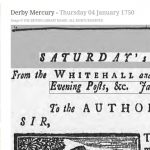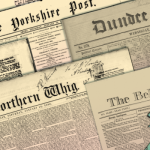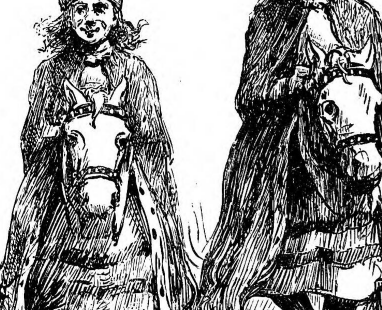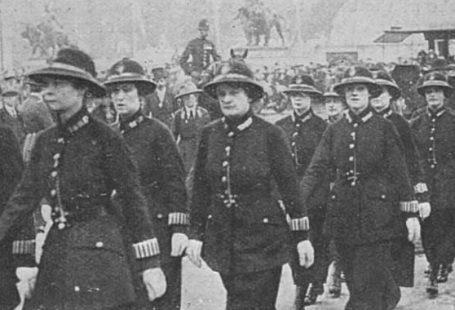We have come to the end of the year and for the month of December we are looking across the month at historic events that occurred during the month including the death of a famous musician, an explorer’s achievement, the first woman in Parliament, and the coronation of Napoleon. We do not claim that these are all the noteworthy historical events in December. If you know of any significant ‘December’ events that you have found in The Archive share them with us in the comments.
December 1, 1919 – Lady Nancy Astor
On 1 December 1919, Lady Nancy Astor was the first woman to take a seat in the British House of Commons. However, she was not the first woman elected to Parliament. That achievement goes to Constance Markievicz in Ireland, but as a member of Sinn Fein she abstained from taking her seat. The Aberdeen Press and Journal explained some as a new rule of etiquette, the newcomer would be addressed as ‘the noble lady’. The Yorkshire Evening Post thought it only necessary to comment on how Lady Astor dressed on her first day in Parliament.


December 1, 1988 – Benazir Bhutto
Another first for a woman, 69 years later, Benzair Bhutto was sworn in as prime minister of Pakistan. The first woman to govern a Muslim nation.

December 2, 1804 – Napoleon Bonaparte

On this day, Napoleon Bonaparte was crowned by Pope Pius VII in Paris as Emperor of France. Full details of the ceremony were published in the Staffordshire Advertiser: ‘Ambitious of the name of the Second Charlemagne, Bonaparte had the coronation ornaments of that great prince borne before him; and entering the cathedral of Notre Dame, with the crown previously placed upon his head by himself, and holding in his hand the hand of justice, he saw a long line before him’.
A letter to the editor of the Morning Post gave a slightly different perspective of the event. ‘Bonaparte was pale and sulky, watching with an anxious and suspicious eye all persons approaching him: and, though surrounded by his most trusty slaves, started often at the foot of the altar, as well as when seated upon the throng, as it from apprehension of the secret presence of some revengeful or hired assassin, or from the irresistible pangs of a guilty conscience’.

December 5, 1791 – Wolfgang Amadeus Mozart
In December of 1791, the famous composer described as ‘most gifted musician in the history of classical music’, died a pauper in Vienna, Austria. He was on his deathbed when he created his celebrated ‘Requiem’. He was convinced that the funeral music he was composing would ‘be completed only in time for his own demise’. At his death, he said to his wife

‘Was I not right when I declared that is was for my own obsequies I was composing this Requiem? I die just when I have triumphed over every difficulty’.
December 6, 1921 – The Irish Free State
The Irish Free State was created with the signing of the Anglo-Irish Treaty at Whitehall at 2:20am on Tuesday 6 December1921. Ireland became an independent member of the British Commonwealth and would hold the same constitutional status as Canada or New Zealand. A boundary commission was created to establish the border of the Northern Irish state which had chosen to secede from the Irish Free State. In The Sphere, you can read the first seven articles of the agreement and a statement from the King.

December 11, 1936 – King Edward VIII

In 1936, King Edward VIII abdicated the throne of England to marry Wallis Warfield Simpson. The abdication meant that the line of succession passed to the Duke of York and his children, including the current Queen of England, Elizabeth II. The Illustrated London News printed a series of images of the Royal family during the days of constitutional crisis leading up to the abdication, including an image of the young future Queen.

December 14, 1861 – Prince Albert

Another significant event in the history of the Royal family was the death of Prince Albert at Windsor Castle in 1861. The death of the Prince led Queen Victoria to go into an extended period of mourning. The Fife Herald printed a brief biography of the late HRH Prince Albert-Francis-Augustus-Charles-Emmanuel of Saxe-Coburg and Gotha. Click on the article to read the full biography.

December 14, 1918 – British women vote
For the first time in history, women over the age of 30 voted in a Parliamentary election and could run for office. Birmingham Daily Post claimed that of the 17 million votes, 7 million were women. It was a momentous moment in history.

The makers of Turban Puddings saw a great opportunity that December for a new marketing slogan!

December 14, 1911 – Roald Amundsen
In 1911 the Norwegian explorer, Roald Amundsen, became the first person to reach the South Pole. He won the race to the pole against Captain Scott. The image below shows the whole continent of Antarctica and the various routes different expeditions took to reach the pole. He made the journey in remarkably short time. You can see Amundsen’s track from the Ross Sea directly to the South Pole.

The thrilling narrative of Amundsen’s journey was printed in The Yorkshire Post on 9 March 1912 with added commentary from Ernest Shackleton.

December 14, 1939 – The League of Nations

In 1939, the League of Nations expelled Soviet Russia for its aggression against Finland. Russia had invaded Finland on 30 November, which started the Russo-Finnish War. The war lasted until 12 March 1940. In response to the aggression, France, Britain, South Africa, Bolivia, the Dominican Republic, Egypt, and Belgium voted to expel Russia from membership. Finland, China, Yugoslavia, and Greece abstained from voting.
December 24, 1814 – The Treaty of Ghent
The Treaty of Ghent officially ended the War of 1812 between Britain and America. In America the war was represented as a ‘second War of Independence’, but for the British, it was just another conflict during the Napoleonic Wars. Treaty negotiations ended on the 24th, but the treaty then needed to be ratified. A letter to the editor of Bath Chronicle and Weekly Gazette on 29 December, explained that ‘the treaty with American has been ratified today by the Prince Regent; and transmitted to Portsmouth, to be conveyed by a ship of war to American with all possible dispatch. The peace at Ghent is supposed to have been hastened on the part of Great Britain in consequence of the gloomy appearance of affairs at the Congress of Vienna.’

December 27, 1831 – Charles Darwin
In 1831, Charles Darwin set out on a five-year global scientific expedition on the HMS Beagle. The launch of this expedition did not make headlines at the time. Darwin was an unpaid researcher who joined the expedition, but it was the observations he made during this voyage that astounded him – fossils of horses in Argentina, fossil sea life in The Andes, and bird wildlife on the on the Galapagos Islands. Even though the initial voyage was not covered in the newspapers, you can find references to Darwin’s work and his experience on the HMS Beagle.








